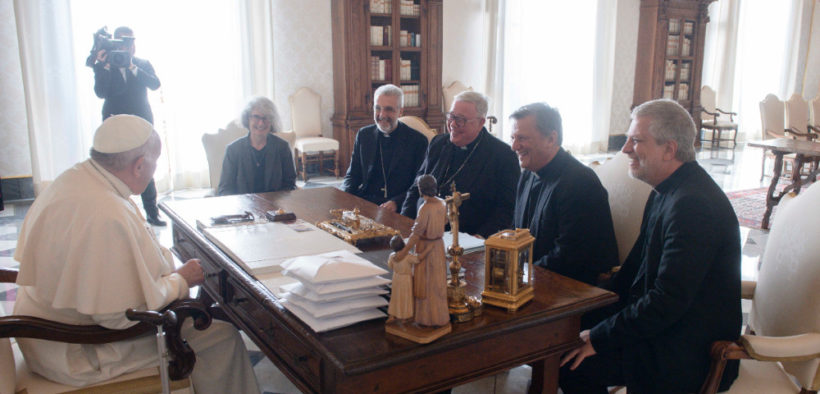Papal calendar: 2023 holds important events for Pope Francis

VATICAN CITY (CNS) — Pope Francis will soon pack his bags for his first foreign trip of 2023, a year that promises to be as busy as ever.
The pope, who celebrated his 86th birthday Dec. 17, can move quickly — in a wheelchair — and keeps saying in interviews that a functioning head and heart — not a well-functioning knee — are essential to the exercise of the papacy.
And, so, his appointment book for 2023 is starting to fill up, although he usually agrees to appointments with the caveat of “God willing.”
Several events are already inked in:
— A pastoral visit to violence-torn Congo Jan. 31-Feb. 3, followed by an ecumenical pilgrimage for peace to South Sudan Feb. 3-5 with Anglican Archbishop Justin Welby of Canterbury and the Rev. Iain Greenshields, moderator of the Presbyterian Church of Scotland.
— Pope Francis celebrates his 10th anniversary as pope March 13.
— He is scheduled to join perhaps 1 million young people from around the globe for World Youth Day Aug. 1-6 in Lisbon, Portugal.
— And the first session of the world Synod of Bishops meeting on “synodality” is scheduled for Oct. 4-29 at the Vatican.
His constant pleas for peace in Ukraine will not end until the war does.
And while Pope Francis indicated Dec. 21 that he had reached, or at least was reaching, the end of a series of general audience lessons about spiritual discernment — what it is, how it is done and how the results are judged — his emphasis on teaching Catholics how to listen to the Holy Spirit when making decisions individually or communally will continue as the synod process does.
In October, saying he did not want to rush the process of discerning how the Holy Spirit is calling the church to grow in “synodality,” the pope announced that the assembly of the Synod of Bishops would take place in two sessions. The gathering scheduled for 2023 is only the first session.
Having published his constitution reforming the Roman Curia in June, Pope Francis is expected to make some changes in the top positions of Curia offices in the coming year.
The normal retirement age for cardinals and bishops working in the Curia is 75, but the pope has often kept cardinals who are prefects of dicasteries in place beyond their 75th birthdays.
The two cardinals likely to retire in 2023 are: Cardinal Luis Ladaria, prefect of the Dicastery for the Doctrine of the Faith, who will be 79 in April and has been in office since 2017; and Cardinal Mauro Piacenza, head of the Apostolic Penitentiary, a Vatican tribunal, who turned 78 in September and has led the office since 2013.
Four other cardinals continue to serve past the age of 75. Cardinal Michael Czerny, prefect of the Dicastery for Promoting Integral Human Development, celebrated his 76th birthday in July. Cardinal Joao Bráz de Aviz will turn 76 in April. Cardinal Kevin J. Farrell, prefect of the Dicastery for Laity, the Family and Life, turned 75 in September. Cardinal Marcello Semeraro, prefect of the Dicastery for the Causes of Saints, celebrated his 75th birthday Dec. 22.
In 2023 Pope Francis also will hear continuing calls to address the clerical sexual abuse scandal and, especially, to ensure greater consistency in dealing with abusers and greater transparency in how the Vatican has handled the cases.
The case of Jesuit Father Marko Rupnik, the Slovenian artist, will continue to make headlines; in late December the Jesuits asked victims to come forward and published a timeline that showed the Vatican’s doctrinal office in May 2020 confirmed the priest had incurred automatic excommunication for granting sacramental absolution to a woman with whom he had had a sexual relationship. After he formally recognized his abuse and expressed repentance, the excommunication was lifted the same month.
In 2021 another allegation of abuse was made by several women who belonged to the Loyola Community he served as a spiritual adviser in Slovenia; the doctrinal office ruled that the statute of limitations had passed and closed the case. News of his previous excommunication came out only after the second case was dismissed, raising questions about why the statute of limitations was not waived and about whether Pope Francis knew about and was involved in lifting the previous excommunication.
Returning to Rome from Bahrain in November, Pope Francis told reporters that over the past 20 years, the Catholic Church had made huge efforts to stop hiding abuse cases and simply shuffling abusive priests to new assignments — “an ugly habit,” he said — and “we are moving forward.”
No comments:
Post a Comment